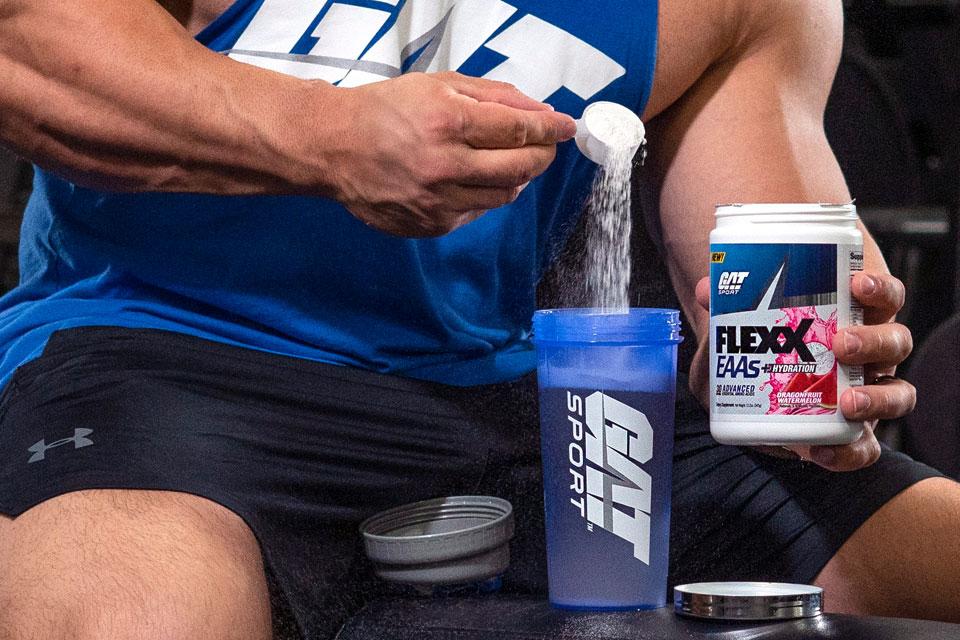Essential amino acids (EAAs) are components of proteins that the human body cannot synthesize itself and must therefore obtain through diet. In sports, there is debate as to whether the targeted intake of isolated EAAs via dietary supplements beyond normal protein intake is beneficial.
Are EAAs useful during training? The role of essential amino acids in muscle building and regeneration
EAAs are indispensable for protein synthesis. They therefore play a central role in muscle building and repair processes, which are particularly important during training.
- EAAs, especially leucine, are key stimuli for the start of muscle protein synthesis. It has been shown that complete protein sources (e.g., whey protein) have the same effect, as they also contain all essential amino acids (Tipton & Wolfe 2001).
- In catabolic situations such as fasting, advanced age, or low-energy diets, the targeted administration of EAAs can reduce muscle breakdown. However, under normal nutritional conditions with adequate protein intake, this supplement is not necessary (Wolfe 2017).
- There is no reliable evidence that EAAs immediately increase endurance performance. Studies by the International Society of Sports Nutrition (JISSN) show either no or only minimal effects (as of 2017).
- EAAs can support the anabolic signal after a workout, which promotes the restoration of muscle protein balance. Whether this noticeably accelerates subjective recovery remains scientifically inconsistent.
Are EAAs useful or overrated? Possible disadvantages and limitations of supplementation
Supplementation with EAAs is generally safe for health, provided that the recommended total protein intake is not exceeded. However, there are practical and economic aspects that should be considered.
- EAAs are significantly more expensive than conventional protein supplements. Since proteins contain all essential amino acids anyway, protein sources often offer advantages in terms of cost-benefit.
- A very high intake has few demonstrable health risks, but can lead to an unbalanced prioritization of amino acids in terms of nutrition. Physiologically, according to the European Food Safety Authority (EFSA), any excess is broken down or excreted.
- The need for EAAs depends heavily on training intensity, dietary patterns, and individual goals. With a balanced protein intake, additional supplementation is hardly necessary, say pioneers of modern sports nutrition such as Dr. James Morton.
- EAAs should not be seen as a substitute for a balanced diet. At best, they can be used as a supplement when protein intake is insufficient.
Taking EAAs sensibly: dosage, timing, and practical recommendations
For athletes who nevertheless decide to take them, the dosage and timing are relevant in practice. In this case, the total protein intake remains the most important factor.
- There is no binding, recommended standard amount of EAAs. Studies typically examine amounts of 6 to 15 g in a training context, but there is no universal recommendation (Wolfe 2017).
- The decisive factor is the total daily protein intake in conjunction with adequate distribution throughout the day. The timing of intake (before or after training) is considered secondary in comparison.
- Combining EAAs with protein powders or BCAAs is not necessary, as complete protein sources already contain all essential amino acids. The additional isolation of individual amino acids does not provide any clear added value (Wolfe 2017).
- When choosing supplements, attention should be paid to composition, purity, and reputable quality controls.
Who can benefit from EAAs? The benefits and relevance of essential amino acids in sports
The potential role of EAAs varies depending on the sporting context. From a scientific point of view, it is not advisable to make a blanket recommendation.
- For people doing strength training, EAAs can theoretically support the anabolic process. In practice, however, the intake of high-quality protein offers the same effect, so supplements are not absolutely necessary (Morton et al. 2018).
- For endurance sports, there is no convincing evidence that additional EAAs improve performance. The most important nutritional factor remains an adequate intake of energy and carbohydrates.
- For moderate training loads, a balanced, protein-rich diet usually provides sufficient nutrition. The additional benefits of EAA supplements are not proven and make little economic sense.
- Before taking supplements, it is advisable to consult a nutritionist to determine your individual needs. This will help you determine whether supplements actually offer advantages over a normal diet.

